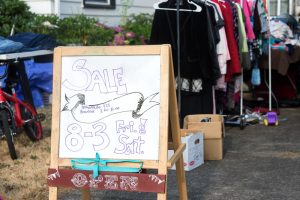After the death of a loved one, you may find yourself needing to sort out that person’s physical estate – their home and belongings. This task can be difficult, especially if the death was recent, but with a plan in place, you can make the process easier. If an estate sale seems the best way to downsize and financially benefit the surviving family, consider these 11 tips for putting on a successful DIY estate sale.
NOTE: If there are any disputes regarding the estate, wait until those conflicts are resolved before hosting an estate sale. Also, honor any bequests in the legal will before putting items up for sale.
11 Tips for Planning a DIY Estate Sale
1. Check Local Guidelines
While the first step isn’t glamorous, it’s best to know what you can and can’t do before you get started. Some cities may require a permit or have certain rules about street signage, parking, or even the day of the week.
The best thing to do is call your City Hall (and your HOA, if applicable) and ask about any laws or regulations regarding estate sales. They will have all the information you need to stay within the bounds of local law.
2. Sort Items and Create an Inventory
Next, figure out what you want to sell. Hold onto any items that have strong sentimental value and give close family members the opportunity to choose a few mementoes before creating your inventory. Once you’ve removed the items you want to keep, start cataloguing what you’d like to sell.
The most common items to sell are jewelry, artwork, clothing, antiques, furniture, appliances, silverware and china, and other household items. You could also sell cars, trucks, campers, electronics, boats, and other large items.
What are some items you shouldn’t sell? Do not sell liquor (a license is required). If items are significantly frayed or damaged (especially car seats, helmets, or items pertaining to safety), do not add them to your inventory. Their ability to protect may be compromised due to heavy use and should not be passed on to others.
3. Remove Any Personal Items
As you sort and create your inventory, remove any personal items at the same time. For example, remove used toiletries, broken items, and other things that will just be thrown away. Additionally, remove any personal documentation, like medical bills, passports, licenses, birth certificates, family photos, and official military documents. Also, if you come across unused prescription medications, make sure to properly dispose of them so they aren’t misused.
4. Look into Tax Implications
Now that you have your inventory, it’s time to find out whether the estate sale will have tax implications for you. While the sale of small items isn’t necessarily going to trigger additional taxes, the sale of larger or rarer items could. For example, are you selling cars? Valuable artwork, antiques, jewelry, or collectibles? These items could add up until they reach the threshold for reporting.
So, with your inventory in hand, speak with a trusted tax professional. They will help you understand whether you may owe taxes when the estate sale is over.
5. Set the Date
Next, keeping your city’s guidelines in mind, you can look at setting a date for your estate sale. Always consider your own calendar first. How much time do you need to organize, price items, gather helping hands, advertise, and so on? Give yourself plenty of time.
Most estate sales occur around the weekend – Thursday through Sunday – and last two or three days. If there are a lot of estate sales in your area, you could instead choose to host the sale during the week to stand out a bit more from the competition.
6. Price Your Items Strategically
Pricing is perhaps the most difficult part of the process. You want to charge enough, but not so much that people don’t want to buy.
Before you price items, do a little research into their resale value. Also, take the item’s condition into account when pricing. For more in-demand items, place a higher price tag. For easy-to-acquire items, like clothing or kitchenware, choose a lower price tag.
And if you want to keep it simple, do bulk sales. For example, “All paperback books $2. All hardback books $3.” And as the estate sale progresses, you can reduce pricing to entice shoppers to buy even more. You could use a pricing scale like “Day 1: Full Price, Day 2: 25% Off, Day 3: 50% Off.” The goal is to sell as much as possible and that may mean negotiating or reducing prices as the sale goes on.
7. Stage the House
To increase your chances of selling items, it’s best to make sure everything is organized and displayed neatly. If your shoppers have to sort through junk piles, they are less likely to stay and discover the treasures waiting to be found.
Instead, you could display silverware, china, and other kitchen items together. Place all the clothes on racks in one area of the house. Group similar clothes together – men’s, women’s, unisex, and children’s. Use the larger spaces to display furniture. Also, ensure that there are easy pathways to get from room to room and add signage to help people know what’s where. And if there are any spaces you don’t want people wandering into, put up “Off Limits” signs.
8. Find People to Staff the Sale
You can’t run an estate sale on your own. So, reach out to your support network to find people who will help you staff the sale.
Here are a few ways trusted friends or family could help:
- Run the payment station
- Load purchased furniture into vehicles
- Answer questions
- Direct traffic
- Monitor each room to answer questions and discourage theft
- Lightly reorganize an area when items nearby are purchased
- Look after any children or pets to keep them out of the way
If you’d like, you could also set up an area where shoppers can purchase baked goods and refreshing beverages. The proceeds could go to benefit a good cause or simply increase the revenue of the estate sale. If it’s a hot day, having cold water bottles on hand for a dollar or two each could keep your shoppers cool and encourage them to stay longer.
9. Set Up an Easy Payment System
While many estate sales are cash-only events, you could also offer electronic sales with a little advance preparation. Set up a Venmo, PayPal, or CashApp account. Or you could rent or purchase a mobile credit card reader. The more payment options you have to offer, the more likely you can facilitate any sale.
Clearly mark the location of the payment table. You could even ask your volunteers to wear a certain color to make them easy to identify. Additionally, make sure you have a secure cash box with enough bills to make change.

10. Advertise Your Estate Sale
To draw the biggest crowd, you’re going to want to advertise. You could go with more traditional methods like signs, flyers, and newspaper ads. To expand your reach, you can also include online methods, like Facebook, Instagram, community forums, or estate sale websites (like www.EstateSales.net or www.EstateSales.org).
Some advertising will cost money while other options will be free of charge. It’s up to you to decide which options you prefer. Also, when you contact City Hall to look into local guidelines, ask if there are any laws or regulations regarding advertising your estate sale.
For any physical signs you create, make sure they are brightly colored and include the dates, times, and address of your estate sale. You could also include pictures or a list of some big-ticket items you are hoping to sell. Post any signs in places that are clearly visible from the road and include directional arrows.
11. Clean Up and Donate
Once the estate sale is over, it’s time to clean up the house and figure out what’s going to happen to any unsold items. If you have the time and energy, you could try to sell items on eBay or Facebook Marketplace. Alternatively, you could drop everything off at a charity donation center, like Salvation Army, Goodwill, Habitat for Humanity, or a local thrift store you’d like to support. A third option is to rent a roll-off dumpster and just toss everything inside. You could even do a little of all three. It’s up to you what works best for your situation.
With these 11 tips, you have the framework for putting on a successful DIY estate sale. However, if all of this seems like too much to deal with during a time of grief, consider the merits of hiring a professional estate sale company to do it for you. Whether you put it on yourself or go with a professional company, an estate sale can be a financially beneficial way to close out a loved one’s physical estate. Best of luck!














